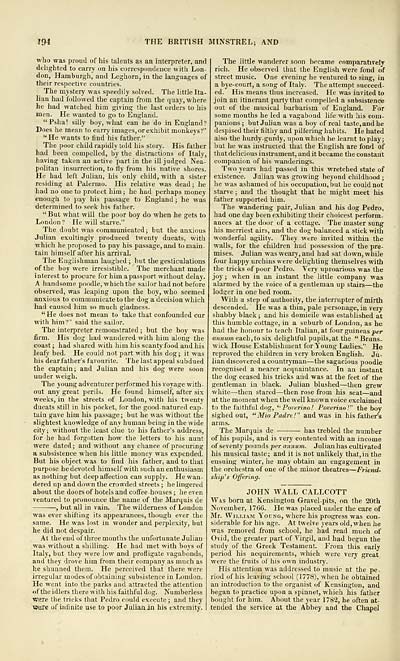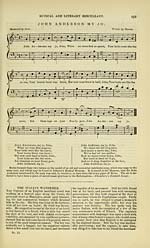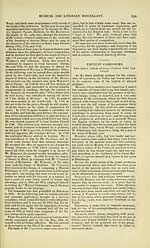Glen Collection of printed music > Printed music > British minstrel, and musical and literary miscellany
(202) Page 194
Download files
Complete book:
Individual page:
Thumbnail gallery: Grid view | List view

194
THE BRITISH MINSTREL; AND
who was proud of his taleuts as an interpreter, and
dehghted to carry on his correspondence with Lon-
don, Hamburgh, and Leghorn, in the languages of
their respective countries.
The mystery was speedily solved. The little Ita-
lian had followed the captain from the quay, where
he had watched him giving the last orders to his
men. He wanted to go to England.
"Psha! silly boy, what can he do in England?
Does he mean to carry images, or e.xhibit monkeys?"
" He wants to find his father."
The poor child rapidly told his story. His father
had been compelled, by the distractions of Italy,
having taken an active part in the ill-judged Nea-
politan insurrection, to iiy from his native shores.
He had left Julian, his only child, with a sister
residing at Palermo. His relative was dead; he
had no one to protect him; he had perhaps money
enough to pay his passage to England; he was
determined to seek liis father.
" But what will the poor boy do when he gets to
London ? He will starve."
The doubt was communicated ; but the anxious
Julian exultingly produced twenty ducats, with
which he proposed to pay his passage, and to main-
tain himself after his arrival.
The Englishman laughed ; but the gesticulations
of the boy were irresistible. The merchant made
interest to procure for himapassport without delay.
A handsome poodle, which the sailor had not before
observed, was leaping upon the boy, who seemed
anxious to communicate to the dog a decision which
had caused him so much gladness.
" He does not mean to take that confounded cur
with him?" said the sailor.
The interpreter remonstrated ; but the boy was
firm. His dog had wandered with him along the
coast ; had shared with him his scanty food and his
leafy bed. He could not part with his dog; it was
his dear father's favourite. The last appeal subdued
the captain; and Julian and his dog were soon
under weigh.
The young adventurer performed his voyage with-
out any great perils. He found himself, after si.K
weeks, in the streets of London, with his twenty
ducats still in his pocket, for the good-natured cap-
tain gave him his passage ; but he was without the
slightest knowledge of any human being in the wide
city ; without the least clue to his father's address,
for he had forgotten how the letters to his aunt
were dated; and without any chance of procuring
a subsistence when his little money was expended.
But his object was to find his father, and to that
purpose he devoted himself with such an enthusiasm
as nothing but deep aft'ection can supply. He wan-
dered up and down the crowded streets ; he lingered
about the doors of hotels and coffee-houses ; he even
ventured to pronounce the name of the JIarquis de
, but all in vain. The wilderness of London
was ever shifting its appearances, though ever the
same. He was lost in wonder and perplexity, but
he did not despair.
At the end of three months the unfortunate Julian
was without a shilling. He had met with boys of
Italy, but they were low and profligate vagabonds,
and they drove him from their company as much as
he shunned them. He perceived that there were
irregular modes of obtaining subsistence in London.
He went into the parks and attracted the attention
of the idlers there with his faithful dog. Numberless
were the tricks that Pedro could execute ; and they
V9eje of infinite use to poor Julianin his extremity.
The little wanderer soon became comparatively
rich. He observed that the English were fond of
street music. One evening he ventured to sing, in
a bye-court, a song of Italy. The attempt succeed-
ed. His means thus increased. He was invited to
join an itinerant party that compelled a subsistence
out of the musical barbarism of England. For
some mouths he led a vagabond life with his com-
panions; but Julian was a boy of real taste, and he
despised their filthy and pilfering habits. He hated
also the hurdy-gurdy, upon which he learnt to play;
but he was instructed that the English are fond of
that delicious instrument, and it became the constant
companion of his wanderings.
Two years had passed in this wretched state of
existence. Julian was growing beyond childhood ;
he was ashamed of his occupation, but he could not
starve; and the thought that he might meet his
father supported him.
The wandering pair, Julian and his dog Pedro,
had one day been exhibiting their choicest perform-
ances at tlie door of a cottage. The master sung
his merriest airs, and the dog balanced a stick with
wonderful agility. They were invited within the
walls, for the children had possession of the pre-
mises. Julian was weary, and had sat down, while
four happy urchins were delighting themselves with
the tricks of poor Pedro. Very uproarious was the
joy ; when in an instant the little company was
alarmed by the voice of a gentleman up stairs — the
lodger in one bed room.
With a step of authority, the interrupter of mirth
descended. He was a thin, pale personage, in very
shabby black ; and his domicile was established at
this humble cottage, in a suburb of London, as he
had the honour to teach Italian, at four guineas per
annum each,to six delightful pupils, at the "Bruns-
wick House Establishment for Young Ladies." He
reproved the children in very broken English. Ju-
lian discovered a countryman — the sagacious poodle
recognised a nearer acquaintance. In an instant
the dog ceased his tricks and was at the feet of the
gentleman in black. Julian blushed — then grew
white — then stared — then rose from his seat — and
at the moment when the well known voice exclaimed
to the faithful dog, "Porerino! Poverino!" the boy
sighed out, "Mio Padre!" and was in his father's
arms.
The Marquis de • has trebled the number
of his pupils, and is very contented with an income
of seventy pounds per annum. Julian has cultivated
his musical taste; and it is not unlikely that, in the
ensuing winter, he may obtain an engagement in
the orchestra of one of the minor theatres — Friend-
ship's Offering.
JOHN WALL CALLCOTT
Was born at Kensington Gravel-pits, on the 20th
November, 1766. He was placed under the care of
Mr. WiLLiAsr YorNG, where his progress was con-
siderable for his age. At twelve years old, when he
was removed from school, he had read much of
Ovid, the greater part of Virgil, and had begun the
study of the Greek Testament. From this early
period his acquirements, which were very great
were the fruits of his own industry.
His attention was addressed to music at the pe ■
riod of his leaving school (1778), when he obtained
an introduction to the organist of Kensington, and
began to practice upon a spinnet, which his father
bought for him. About the year 1782, he often at-
tended the service at the Abbey and the Cliapel
THE BRITISH MINSTREL; AND
who was proud of his taleuts as an interpreter, and
dehghted to carry on his correspondence with Lon-
don, Hamburgh, and Leghorn, in the languages of
their respective countries.
The mystery was speedily solved. The little Ita-
lian had followed the captain from the quay, where
he had watched him giving the last orders to his
men. He wanted to go to England.
"Psha! silly boy, what can he do in England?
Does he mean to carry images, or e.xhibit monkeys?"
" He wants to find his father."
The poor child rapidly told his story. His father
had been compelled, by the distractions of Italy,
having taken an active part in the ill-judged Nea-
politan insurrection, to iiy from his native shores.
He had left Julian, his only child, with a sister
residing at Palermo. His relative was dead; he
had no one to protect him; he had perhaps money
enough to pay his passage to England; he was
determined to seek liis father.
" But what will the poor boy do when he gets to
London ? He will starve."
The doubt was communicated ; but the anxious
Julian exultingly produced twenty ducats, with
which he proposed to pay his passage, and to main-
tain himself after his arrival.
The Englishman laughed ; but the gesticulations
of the boy were irresistible. The merchant made
interest to procure for himapassport without delay.
A handsome poodle, which the sailor had not before
observed, was leaping upon the boy, who seemed
anxious to communicate to the dog a decision which
had caused him so much gladness.
" He does not mean to take that confounded cur
with him?" said the sailor.
The interpreter remonstrated ; but the boy was
firm. His dog had wandered with him along the
coast ; had shared with him his scanty food and his
leafy bed. He could not part with his dog; it was
his dear father's favourite. The last appeal subdued
the captain; and Julian and his dog were soon
under weigh.
The young adventurer performed his voyage with-
out any great perils. He found himself, after si.K
weeks, in the streets of London, with his twenty
ducats still in his pocket, for the good-natured cap-
tain gave him his passage ; but he was without the
slightest knowledge of any human being in the wide
city ; without the least clue to his father's address,
for he had forgotten how the letters to his aunt
were dated; and without any chance of procuring
a subsistence when his little money was expended.
But his object was to find his father, and to that
purpose he devoted himself with such an enthusiasm
as nothing but deep aft'ection can supply. He wan-
dered up and down the crowded streets ; he lingered
about the doors of hotels and coffee-houses ; he even
ventured to pronounce the name of the JIarquis de
, but all in vain. The wilderness of London
was ever shifting its appearances, though ever the
same. He was lost in wonder and perplexity, but
he did not despair.
At the end of three months the unfortunate Julian
was without a shilling. He had met with boys of
Italy, but they were low and profligate vagabonds,
and they drove him from their company as much as
he shunned them. He perceived that there were
irregular modes of obtaining subsistence in London.
He went into the parks and attracted the attention
of the idlers there with his faithful dog. Numberless
were the tricks that Pedro could execute ; and they
V9eje of infinite use to poor Julianin his extremity.
The little wanderer soon became comparatively
rich. He observed that the English were fond of
street music. One evening he ventured to sing, in
a bye-court, a song of Italy. The attempt succeed-
ed. His means thus increased. He was invited to
join an itinerant party that compelled a subsistence
out of the musical barbarism of England. For
some mouths he led a vagabond life with his com-
panions; but Julian was a boy of real taste, and he
despised their filthy and pilfering habits. He hated
also the hurdy-gurdy, upon which he learnt to play;
but he was instructed that the English are fond of
that delicious instrument, and it became the constant
companion of his wanderings.
Two years had passed in this wretched state of
existence. Julian was growing beyond childhood ;
he was ashamed of his occupation, but he could not
starve; and the thought that he might meet his
father supported him.
The wandering pair, Julian and his dog Pedro,
had one day been exhibiting their choicest perform-
ances at tlie door of a cottage. The master sung
his merriest airs, and the dog balanced a stick with
wonderful agility. They were invited within the
walls, for the children had possession of the pre-
mises. Julian was weary, and had sat down, while
four happy urchins were delighting themselves with
the tricks of poor Pedro. Very uproarious was the
joy ; when in an instant the little company was
alarmed by the voice of a gentleman up stairs — the
lodger in one bed room.
With a step of authority, the interrupter of mirth
descended. He was a thin, pale personage, in very
shabby black ; and his domicile was established at
this humble cottage, in a suburb of London, as he
had the honour to teach Italian, at four guineas per
annum each,to six delightful pupils, at the "Bruns-
wick House Establishment for Young Ladies." He
reproved the children in very broken English. Ju-
lian discovered a countryman — the sagacious poodle
recognised a nearer acquaintance. In an instant
the dog ceased his tricks and was at the feet of the
gentleman in black. Julian blushed — then grew
white — then stared — then rose from his seat — and
at the moment when the well known voice exclaimed
to the faithful dog, "Porerino! Poverino!" the boy
sighed out, "Mio Padre!" and was in his father's
arms.
The Marquis de • has trebled the number
of his pupils, and is very contented with an income
of seventy pounds per annum. Julian has cultivated
his musical taste; and it is not unlikely that, in the
ensuing winter, he may obtain an engagement in
the orchestra of one of the minor theatres — Friend-
ship's Offering.
JOHN WALL CALLCOTT
Was born at Kensington Gravel-pits, on the 20th
November, 1766. He was placed under the care of
Mr. WiLLiAsr YorNG, where his progress was con-
siderable for his age. At twelve years old, when he
was removed from school, he had read much of
Ovid, the greater part of Virgil, and had begun the
study of the Greek Testament. From this early
period his acquirements, which were very great
were the fruits of his own industry.
His attention was addressed to music at the pe ■
riod of his leaving school (1778), when he obtained
an introduction to the organist of Kensington, and
began to practice upon a spinnet, which his father
bought for him. About the year 1782, he often at-
tended the service at the Abbey and the Cliapel
Set display mode to: Large image | Transcription
Images and transcriptions on this page, including medium image downloads, may be used under the Creative Commons Attribution 4.0 International Licence unless otherwise stated. ![]()
| Special collections of printed music > Glen Collection of printed music > Printed music > British minstrel, and musical and literary miscellany > (202) Page 194 |
|---|
| Permanent URL | https://digital.nls.uk/91437369 |
|---|
| Description | Scottish songs and music of the 18th and early 19th centuries, including music for the Highland bagpipe. These are selected items from the collection of John Glen (1833 to 1904). Also includes a few manuscripts, some treatises, and other books on the subject. |
|---|
| Description | The Glen Collection and the Inglis Collection represent mainly 18th and 19th century Scottish music, including Scottish songs. The collections of Berlioz and Verdi collected by bibliographer Cecil Hopkinson contain contemporary and later editions of the works of the two composers Berlioz and Verdi. |
|---|

